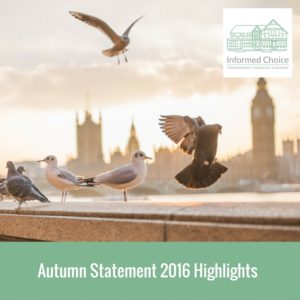 Chancellor Philip Hammond presented his Autumn Statement to the House of Commons at lunchtime today.
Chancellor Philip Hammond presented his Autumn Statement to the House of Commons at lunchtime today.
This is Hammond’s first Autumn Statement and the first since the UK’s decision to leave the European Referendum in June.
The Chancellor promised “fiscal headroom” to help support the British economy through Brexit.
He shared the latest Office for Budget Responsibility (OBR) growth forecast, which was upgraded to 2.1% in 2016, then downgraded to 1.4% in 2017.
OBR is now forecasting economic growth of 1.7% in 2018, 2.1% in 2019 and 2020 and 2% in 2021.
The Chancellor said:
“While the OBR is clear that it cannot predict the deal the UK will strike with the EU, its current view is that the referendum decision means that potential growth over the forecast period is 2.4 percentage points lower than would otherwise have been the case,”
The deficit, measured by public sector net borrowing as a percentage of GDP, is forecast to fall from 4% in 2015 to 3.5% in 2016. This deficit is forecast to keep falling over the next five years, before reaching 0.7% in 2021/22.
Hammond explained that this will be the lowest deficit as a share of GDP in two decades.
Click here to download your free briefing note
On productivity, a National Productivity Investment Fund of £23bn is announced. This money will be spent on innovation and infrastructure during the next five years.
There will be a £2.3bn housing infrastructure fund which will help provide 100,000 new homes in those areas with the greatest demand and £14bn to help provide an extra 40,000 affordable homes.
On pensions, the triple-lock for escalation to State Pensions will remain in place until the end of this parliament.
No further changes to corporation tax, which will fall to 17%, the lowest rate in the G20.
Employee and employer National Insurance thresholds to be aligned at £157 a week, resulting in a marginally higher cost for employers next year.
Insurance Premium Tax will rise from 10% to 12% from next June.
The money purchase annual allowance, which applies to people taking a taxable income from their pension pot, will be cut from £10,000 to £4,000.
There is a ban on salary sacrifice arrangements, although this appears to exempt pension contributions and childcare for the moment.
The income tax personal allowance will rise to £12,500 by 2020.
Government will consult on how best to ban pensions cold calling and take wider action on pensions scam.
A new savings bond will be introduced through National Savings & Investment, with an expected interest rate of 2.2% and a three year term. It will be limited at £3,000 per saver. Details will be announced in the Budget next year.
Big changes to the Budget and Autumn Statement system. The Spring Budget next year will be the last too, moving to an Autumn Budget. There will then be a Spring Statement, responding to the OBR forecasts.
Click here to download your free briefing note

